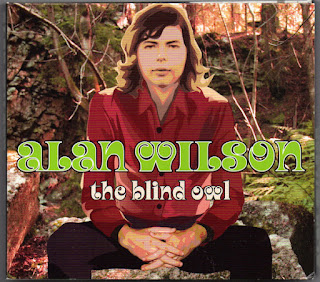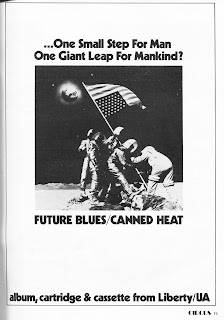Canned Heat fused its founders’ love of classic Delta and Chicago blues music with the new highly-amped electric blues of the late 1960s, the band helping bring the music of the giants of the blues to an eager, enthusiastic white rock ‘n’ roll audience. Essential to Canned Heat’s early success was Alan Wilson, the band’s shy, visually-impaired singer and guitarist whose reedy, Skip James-styled vocals, vibrant harp playing, underrated fretwork, and deep knowledge of and love for the blues helped shaped the band’s trademark sound. Aside from being a talented musician, Wilson was also a musical historian and fanatical record collector, his deeply-researched essays on artist like House and Robert Pete Williams widely acclaimed as scholarly works.
Alan Wilson’s The Blind Owl
Although Canned Heat carries on today as a mere shadow of the original band, they were never really the same after the loss of Wilson in 1970 to a drug overdose at the age of 27. Alan Wilson seldom gets his due as the influential musician that he was, a talent who played alongside legends like Son House, John Lee Hooker, and Sunnyland Slim, among others. After listening to The Blind Owl, a twenty-track, two-disc career retrospective that revisits Wilson’s musical legacy, one is forced to reconsider the artist’s importance in the scheme of things. After all, this is the guy that helped House “re-learn” how to play his songs when the Delta bluesman was rediscovered during the early 1960s folk-blues boom, a task that earned him a place on stage alongside the equally reluctant blues legend at the Newport Folk Festival.
Wilson was a humble and unassuming talent that reveled in the sheer joy of music-making, finding a solace in the blues that he was unable to find in the real world. The Blind Owl draws the bulk of its material from the five Canned Heat albums recorded between 1967 and 1970, with a handful of rare singles and obscure tracks mixed in. Appropriately enough, The Blind Owl opens with “On The Road Again,” one of Wilson’s two biggest and best-known hits. Fueled by Wilson’s mournful vocals, squalls of harp, and choogling guitar riffs, the song’s unusual vibe and slinky groove would drive the band’s sophomore album Boogie With Canned Heat to number sixteen on the charts, the song becoming a worldwide hit and a staple of FM rock stations across the U.S.
Going Up The Country
Ditto for Wilson’s “Going Up The Country,” from 1968’s Living With The Blues, another Top Ten hit which became the soundtrack for the Woodstock Nation after the band’s energetic performance at the legendary festival, and their subsequent appearance in the Woodstock documentary film. With an upbeat melody “borrowed” from a Henry Thomas blues tune, and fresh anti-Vietnam war lyrics from Wilson, the song’s relentless boogie rhythm was punctuated by Wilson’s laid-back harp play. With the blockbuster hits out of the way, one can concentrate on the less well-known but equally magnificent (or more so) musical moments on The Blind Owl. Wilson’s “An Owl Song,” for instance, is a lively sort of jump-blues that features Dr. John’s raging honky-tonk piano-playing and some tasteful harpwork.
An inspired cover of Sonny Boy Williamson’s rockin’ “Help Me” was Wilson’s debut as a vocalist and a fine…if tentative…first turn at the microphone taken from the band’s self-titled 1967 debut, while the introspective “My Mistake,” Wilson’s first lyrical stab at wrestling with his own shyness and insecurity, features an emotional vocal performance matched with guitarist Henry “Sunflower” Vestine’s stinging, trembling fretwork. Wilson’s “Get Off My Back” is another personal composition, the anti-authoritarian lyrics masked by the singer’s light-hearted vocals and Vestine’s rockabilly-cum-psychedelic lightning bolts.
Shake It And Break It
The rare 1969 single “Poor Moon” provides a glimpse at Wilson’s environmental concerns and activism with its intelligent lyricism, while an obscure cover of Little Walter Jacob’s “Mean Old World,” recorded in 1967 but unreleased until 1994 as part of a Canned Heat “best of” album, displays Wilson’s amazing harp skills as he builds upon Jacobs’ original instrumentation with some imaginative flourishes and engaging tones of his own. “Human Condition” was Wilson’s final studio recording with Canned Heat, another obscurity from the archives, a musically upbeat but lyrical downer where Wilson’s growing despondence can be heard in the cracks and strains in his voice, while the band’s relentless, endless guitar-driven boogie drones on behind his pain. The instrumental “Childhood’s End” focuses on Wilson’s chromatic harp playing, the song’s emotional undertones bolstered by a droning guitar line that reinforces Wilson’s smothering loneliness.
The Reverend’s Bottom Line
Produced by Skip Taylor (the band’s manager and 1970s-era producer) and Canned Heat drummer Adolfo De La Perra, The Blind Owl presents a fine argument for Alan Wilson’s musical legacy. Choosing songs that were written by and/or sung by Wilson and/or feature his instrumentation at the fore, they place the spotlight firmly on Wilson’s talents as a vocalist, world class harmonica master, and underrated rhythm and slide-guitar player.
My only complaint about The Blind Owl is the lack of material from Wilson’s extracurricular activities – certainly a song or two from Hooker ‘n Heat, the band’s acclaimed 1971 collaboration with the legendary John Lee Hooker, would have been available as the album was released by Canned Heat’s label, or maybe something from Son House’s 1965 album The Legendary Son House: Father of the Folk Blues which featured Wilson playing alongside the Delta legend. This minor cavil aside, The Blind Owl is an amazing tribute to a bona fide blues legend in Alan Wilson, as well as a fine introduction to the often-overlooked blues-rock style of Canned Heat. (Severn Records, released April 16, 2013)
Buy the CD on Amazon.com: Alan Wilson’s The Blind Owl



No comments:
Post a Comment